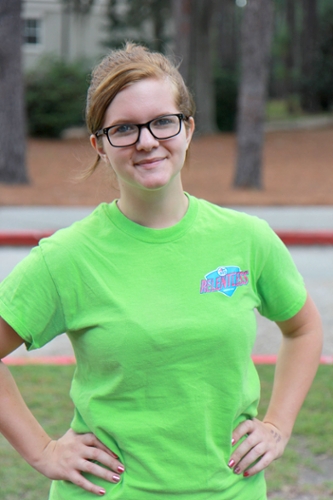September 9, 2014
14-268
Jessica Pope
Communications and Media Relations Coordinator
Brianna Walker Joins ALS Movement in Memory of Grandmother

|
VALDOSTA — Brianna E. Walker, an 18-year-old first-year student at Valdosta State University, has already accepted the ALS Association’s wildly popular and global ice bucket challenge. On Saturday, Sept. 13, she will lead a team of family and friends — collectively known as Saundra’s Hummers — in the Walk to Defeat ALS in Atlanta.
Walker’s recent involvement with the ALS Association was spurred by the death of her grandmother, Saundra Lien of Forsyth, who succumbed to complications of the disease in April. She had just turned 68 years old; was loved for her sassy, sarcastic, Southern charm; and had a fondness for hummingbirds.
“I didn’t even know about this disease until my grandmother was diagnosed with it,” noted the 2014 graduate of Highland Christian Academy who is pursuing a Bachelor of Science in Education (B.S.Ed.) in American Sign Language / English interpreting. “My goal is to raise awareness and raise money and help them find a cure.”
Walker’s grandmother was diagnosed with ALS during late summer 2013.
According to the ALS Association (www.alsa.org), amyotrophic lateral sclerosis, also known as Lou Gehrig’s Disease, is a progressive neurodegenerative disease affecting nerve cells in the brain and spinal cord. Early symptoms vary but frequently include tripping, dropping things, abnormal fatigue of the arms and/or legs, slurred speech, muscle cramps and twitches, and/or uncontrollable periods of laughing or crying.
ALS attacks the motor neurons that reach from the brain to the spinal cord and from the spinal cord to the muscles throughout the body. The progressive degeneration of the motor neurons eventually leads to their death. When the motor neurons die, the ability of the brain to initiate and control muscle movement is lost, and the affected individual slowly loses his or her ability to walk, speak, swallow, and breathe.
There is no cure or treatment for ALS. However, the Food and Drug Administration has approved a drug that modestly slows the progression of the disease. Also there are reportedly several promising clinical trials underway.
Brianna E. Walker can be reached via email at briannwalker@valdosta.edu for more information.
On the Web:
http://webga.alsa.org/site/TR/Walks/Georgia?px=4088033&pg=personal&fr_id=10136#.VA3QOP1cXXp
Fast Facts
• ALS is not contagious.
• Approximately 5,600 people in the United States are diagnosed with ALS each year. The incidence of ALS is two per 100,000 people, and it is estimated that as many as 30,000 Americans may have the disease at any given time.
• Although the life expectancy of an ALS patient averages about two to five years from the time of diagnosis, this disease is variable and many people live with quality for five years and more. More than half of all patients live more than three years after diagnosis.
• About 20 percent of people with ALS live five years or more and up to 10 percent will survive more than 10 years and five percent will live 20 years. There are people in whom ALS has stopped progressing and a small number of people in whom the symptoms of ALS reversed.
• ALS can strike anyone. It occurs throughout the world and knows no racial, ethnic, or socioeconomic boundaries.
• The onset of ALS is insidious, with muscle weakness or stiffness reported as early symptoms. Progression of weakness, wasting, and paralysis of the muscles of the limbs and trunk, as well as those that control vital functions such as speech, swallowing, and later breathing, generally follows.
• Riluzole, the first treatment to alter the course of ALS, was approved by the FDA in late 1995. This antiglutamate drug was shown scientifically to prolong the life of persons with ALS by at least a few months.
Source: ALS Association at http://www.alsa.org
Valdosta State University’s 2013-2019 Strategic Plan represents a renewal of energy and commitment to the foundational principles for comprehensive institutions.
Implementation of the plan’s five goals, along with their accompanying objectives and strategies, supports VSU’s institutional mission and the University System of Georgia’s mission for comprehensive universities.
Brianna E. Walker’s participating in the 2014 Walk to Defeat ALS in Atlanta meets the following goal:
Goal 3: Promote student, employee, alumni, retiree, and community engagement in our mission.
Visit http://www.valdosta.edu/administration/planning/strategic-plan.php to learn more.
Newsroom
- Office of Communications Powell Hall West, Suite 1120
-
Mailing Address
1500 N. Patterson St.
Valdosta, GA 31698 - General VSU Information
- Phone: 229.333.5800
- Office of Communications
- Phone: 229.333.2163
- Phone: 229.333.5983